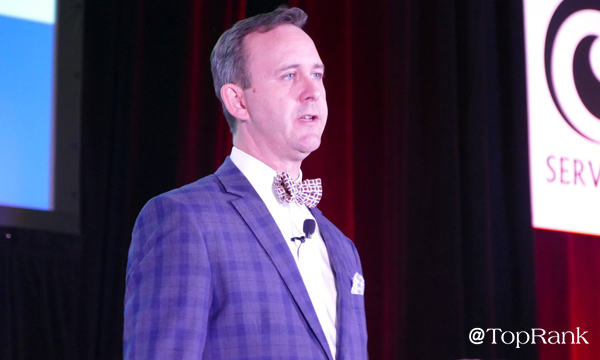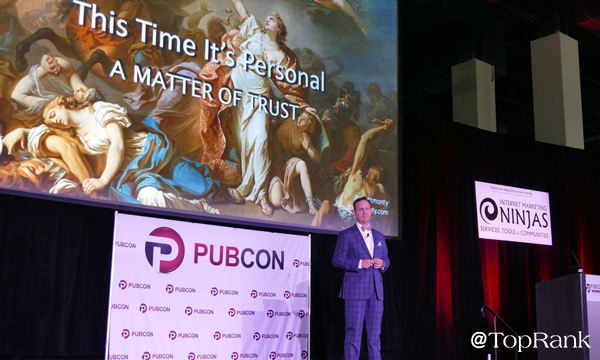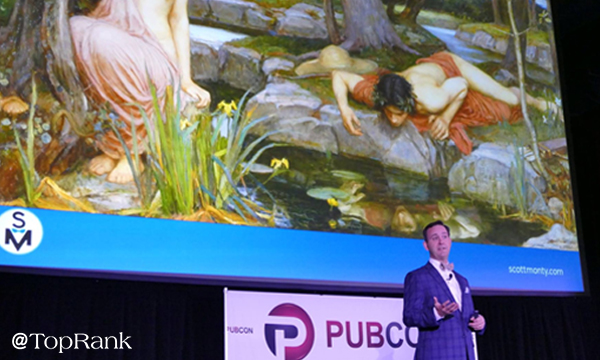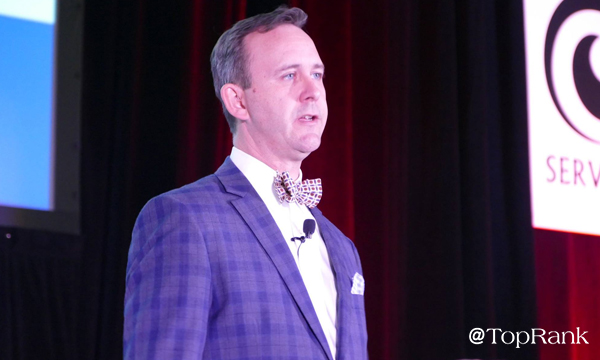Fear isn’t new, Scott said, and as such now we face an overabundance of content that has created a trust deficit. Taking a close look at human nature’s self-involvement, Scott asked what the 250 or more people who have died taking selfies since 2011 says about us, also using an example of Narcissus and Echo — including a slide featuring the famous 1903 John William Waterhouse painting. How can we reconcile all this, with many brands today also so focused on themselves, creating a wall between people and brands? The Trust Equation Scott singled out personalization as one of the most important ways to make things relevant to people once again, and said that can begin for brands by simply knowing and using a customer’s name. Putting yourself in the other’s shoes is something Scott recommended, along with asking yourself just what makes your customers tick — what do they think about? Brands should also look internally and ask themselves, “What data do we have?” — because people like it when brands know their name, he said, and pointed out that in e-mail communications, three of the most important pieces of data brands can have are: First Names E-mail Addresses ZIP Codes Are You A Norm Or A Cliff? With your customers using so many platforms, a major obstacle is knowing the various handles they’re using on different social properties, and Scott asked how we can learn them all, so that the conversation between brand and consumer can continue no matter the platform. Customers will only give you so much information, he pointed out — sometimes just providing a last name is where this can drop off — so the less you can ask for the better at first. Scott pointed out a May 2018 eMarketer study showing $150 as the amount most consumers would take to hand over their personal data, but urged us to look beyond the mere data to uncover the stories behind the numbers. Stories are inherently emotional — they’re human and have been a part of us since the dawn of time, Scott explained, sharing the story of Ernest Hemingway’s famous $10 bet to achieve a meaningful story in six words or less.

Scott Monty brought his nuanced and precisely-paced neoclassical style of marketing to Pubcon Pro Las Vegas 2018, leading off with a Longfellow poem — a refreshing non-technical respite from the buzzwords otherwise pouring forth from most presenters at the tech-savvy conference, as he delivered a mainstage address about social media, trust, and personalization.
Scott, who was a classics major, began by noting that much of human nature is constant all around the world, with people holding the same shared motivations, including many great human truths behind what we do that still apply today — perhaps more than ever.
We’re faced with a huge trust deficit, however, as confidence among us in general has plummeted, which Scott sees as a primary gap to be filled.
Singling out Facebook’s near-daily barrage of breakdowns in trust, Scott pointed out that instead of focusing only on re-establishing its foundation of trust, astoundingly the social media giant chose to launch its Facebook Portal in-home camera product, and asked why it comes with a lens cover if people trust your brand.

Amidst the backdrop of Google Plus closing shop except for certain enterprise users, Scott said that we currently see an average of some 3,500 brand messages daily, from the logos on our phones to the seemingly-endless variety of ways to get in front of our eyes, and asked how we as marketers can ever hope to break through when there isn’t trust for our brand.
What’s Old In Personalization Is New Again
With the average amount of time spent online continuing to increase, especially with mobile’s rise, Scott asked the Pubcon audience if they knew who has warned of an overwhelmed and distracted brain on information overload, preventing us from doing the things that truly make us human, and then give a surprising answer.
Scott, donned in his trademark suit and bowtie, was talking about sixteenth-century Swiss naturalist Conrad Gessner, who wrote about the dangers of the Guttenberg printing press more than 450 years ago.
Fear isn’t new, Scott said, and as such now we face an overabundance of content that has created a trust deficit.
Scott pointed out that what we were once promised was, “It’s all about you,” with the consumer having the power when it comes to conversations with brands, but asked whether we have truly delivered on that promise.
Taking a close look at human nature’s self-involvement, Scott asked what the 250 or more people who have died taking selfies since 2011 says about us, also using an example of Narcissus and Echo — including a slide featuring the famous 1903 John William Waterhouse painting.

How can we reconcile all this, with many brands today also so focused on themselves, creating a wall between people and brands?
The Trust Equation
Scott singled out personalization as one of the most important ways to make things relevant to people once again, and said that can begin for brands by simply knowing and using a customer’s name.
Scott said that an equation of trust is needed, leading to a healthy customer relationship and to brand loyalty, but that this requires a frictionless experience, otherwise in today’s world where time is so highly valued, your…

COMMENTS